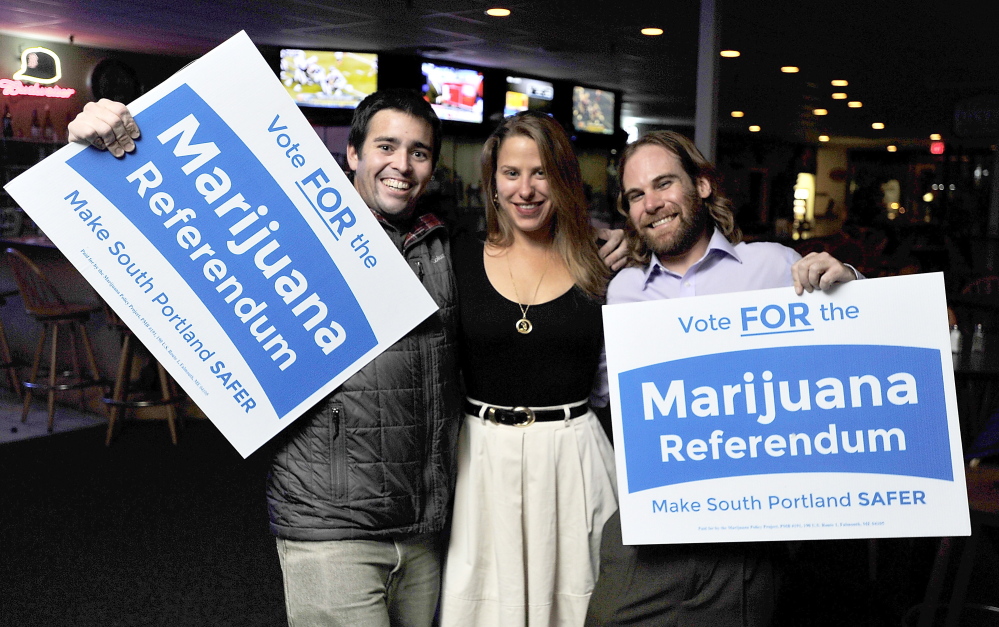Lewiston’s rejection of a marijuana legalization ordinance set the city apart on an Election Day that otherwise appeared to show growing momentum for legalizing pot around the country.
Not only did South Portland voters support legalization Tuesday, but so did voters in Oregon, Alaska and the District of Columbia.
The decisive “No” vote in Lewiston – 55 percent to 45 percent – is seen by opponents as a sign that legalization is not inevitable in Maine, despite the state being identified as fertile ground for the movement.
But advocates say the support from many voters there and from 52 percent of the voters in South Portland succeeded in laying groundwork for a statewide vote on the issue in two years.
With its vote in favor of legalization Tuesday, South Portland became the second city on the East Coast to pass an ordinance legalizing recreational possession of small amounts of marijuana for adults. Portland became the first in a 2013 referendum.
Also on Tuesday, voters in Oregon, Alaska and Washington, D.C., approved measures to legalize recreational pot. The only major loss for advocates was in Florida, where a proposal to allow medical marijuana garnered 58 percent of the vote, just shy of the 60 percent required to pass.
Advocates say the votes signal Americans are ready to expand legalization beyond Colorado and Washington state, where marijuana use was approved in 2012. The momentum sets the stage for statewide votes in 2016 in California, Massachusetts, Maine, Nevada and Arizona. The Marijuana Policy Project also is focusing on legislative measures to end marijuana prohibition in Delaware, Maryland, Hawaii, New Hampshire, Vermont and Rhode Island.
Rob Kampia, executive director of the Marijuana Policy Project, said Tuesday’s elections were “a large step forward” toward ending marijuana prohibition.
“The results are in and marijuana prohibition is on its way out,” he said in a prepared statement. “From Alaska to Maine, voters are calling for more sensible, evidence-based marijuana policies. Americans are fed up with wasteful and ineffective laws that punish adults for using a less harmful substance than alcohol.”
NEXT EFFORT UNDERWAY
David Boyer, Maine political director of the Marijuana Policy Project, said his group is disappointed with the Lewiston vote, but is already shifting its focus to crafting a law to legalize pot. He anticipates the group will begin collecting signatures this spring to get the issue on the state ballot in 2016.
“Every year our movement to make marijuana legal gains momentum,” he said.
But for Scott Gagnon, director of Smart Approaches to Marijuana Maine, the Lewiston vote is a sign that Mainers are ready to fight the legalization push.
“The clear trend is that as the Marijuana Policy Project moves further away from Portland, the less support they have,” he said.
Gagnon said he’s heard from people across the state who are concerned about the impact legalizing marijuana will have on youth and communities, sentiments echoed in Lewiston by city leaders and voters.
“There’s this feeling in Lewiston that outside the city we’re viewed in a negative light,” he said. “I think many in Lewiston believe that legalizing marijuana doesn’t fit with initiatives to change the city’s image. The people of Lewiston stood up and said ‘No, this is not going to be part of our community.'”
Kevin Sabet, president of the national group Smart Approaches to Marijuana and a former drug policy adviser for the Obama administration, said opponents to legalization were outspent by advocates, which he believes impacted the message voters were receiving about the impact of allowing adults to use the drug.
THOUGHTS TURN TO 2016
“A silver lining, of course, was that voters in cities from Colorado to Maine rejected retail legalization outright,” he said. “We will build on those gains.”
Voters in five Colorado communities voted to ban retail marijuana shops.
Undeterred by the tally in Lewiston, Boyer said he will soon begin the process of drafting an initiative collaboratively with people who want a hand in crafting a new policy for Maine. He hopes that will include Mainers who work in law enforcement and substance abuse prevention.
“I think (these votes) send an optimistic message about taxing and regulating marijuana at the state level. Having two of the four biggest cities in Maine say that marijuana prohibition doesn’t work and we want a new approach is good,” he said. “I think in 2016 Lewiston voters will go the other way.”
Send questions/comments to the editors.




Success. Please wait for the page to reload. If the page does not reload within 5 seconds, please refresh the page.
Enter your email and password to access comments.
Hi, to comment on stories you must . This profile is in addition to your subscription and website login.
Already have a commenting profile? .
Invalid username/password.
Please check your email to confirm and complete your registration.
Only subscribers are eligible to post comments. Please subscribe or login first for digital access. Here’s why.
Use the form below to reset your password. When you've submitted your account email, we will send an email with a reset code.